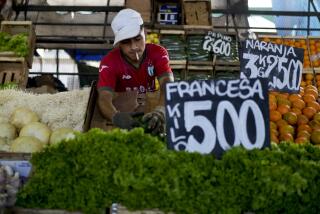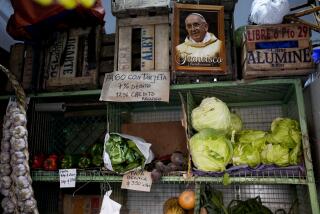Inflation in Brazil Sparks Fears of Unrest : Trouble in Neighboring Argentina Recalled
- Share via
RIO DE JANEIRO — Monthly Brazilian inflation is climbing into the double-digit range again, and analysts are voicing fear of economic turmoil similar to that in neighboring Argentina.
An official price freeze--called the “summer plan”--was imposed in January, but Brazil’s inflation increased from 3.6% in February to 9.9% in May. Economists forecast that June inflation will be as high as 17%, which would equal an annual rate of more than 500%.
Inflation last year was a record 934%, peaking with a monthly rate in December of 28.8%.
President Jose Sarney and Finance Minister Mailson Nobrega have contended that the summer plan saved the country from hyperinflation. But as the plan has given way to surging prices, concern over the possibility of hyperinflation has returned.
In May, Brazilians watched with foreboding as the Argentine economy exploded with hyperinflation, a dizzying spiral that was estimated at more than 70% for the month. With Argentina’s economic chaos came looting of supermarkets and an official state of siege.
Commentators have adapted a phrase from a vodka commercial, “I am you tomorrow,” to forecast similar troubles for Brazil.
“When the economic and political histories of Argentina and Brazil are compared, the parallels are impressive,” Sao Paulo economist Paul Singer observed recently. “The failure of the summer plan raises the concrete danger of hyperinflation in Brazil. . . . The dimensions of the Argentine drama can help us to better understand that with hyperinflation no one wins.”
The Brazilian and Argentine economies are both burdened with heavy foreign debts that contribute to inflationary government deficits. Inflation is also fueled in both countries by political uncertainty and speculation based on the assumption that prices inevitably will rise.
With prices officially frozen, increasing production costs for many goods in Brazil have eroded profit margins and led to shortages. Retailers charge under-the-counter premiums for products from beef to automobiles.
As a result, the government has recognized the futility of an absolute freeze. Last week, authorities announced a new system of “monitored freedom” that would permit many prices to rise when justified by cost increases.
Administering Inflation
The newspaper Folha de Sao Paulo said in a weekend editorial that the measure was necessary but warned that the newly released prices will exert additional inflationary pressure.
“Inflation must again seek its parameters of relative balance,” the newspaper said. “In this process, however, there is the risk that uncertainties will end up making the inflation uncontrollable.”
Nobrega was quoted recently as telling a friend that he felt “like someone bailing water out of a boat. The problem is, the boat has holes.”
It has become clear that the goal of Sarney’s transitional Administration is not to brake inflation but to “administer” it, avoiding the disaster of hyperinflation before a new president is inaugurated next March. After military rule from 1964 to 1985, the country’s first popular presidential elections since 1960 are scheduled for Nov. 15.
More to Read
Sign up for Essential California
The most important California stories and recommendations in your inbox every morning.
You may occasionally receive promotional content from the Los Angeles Times.










